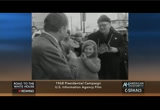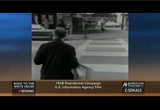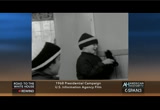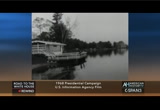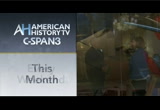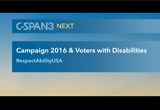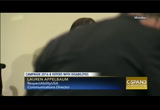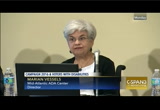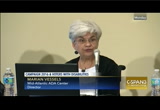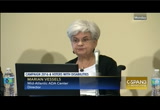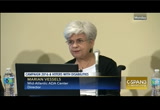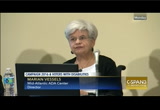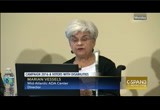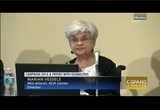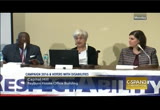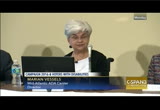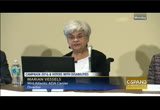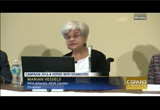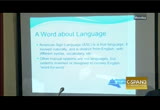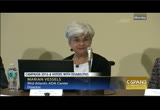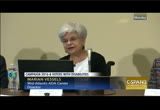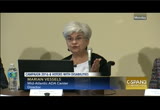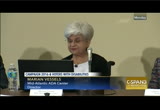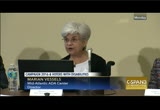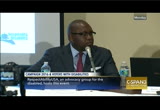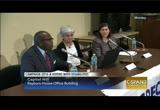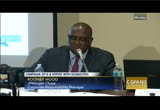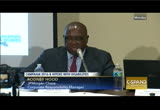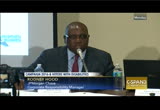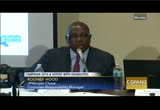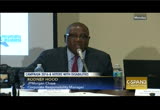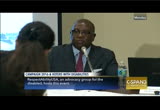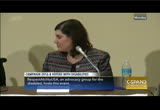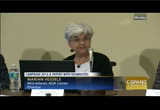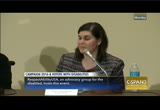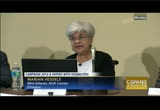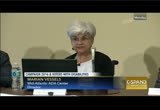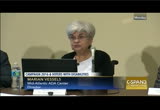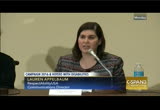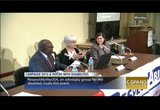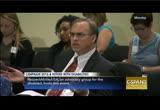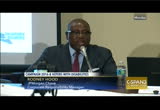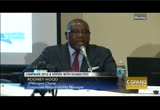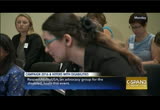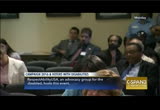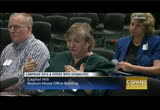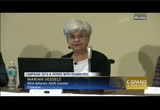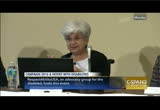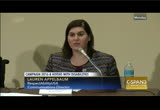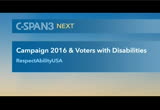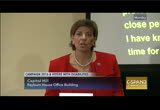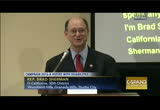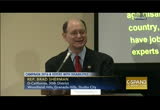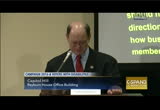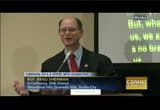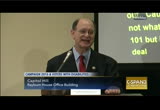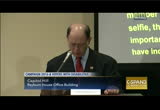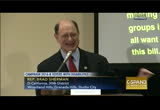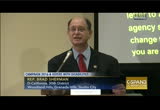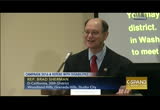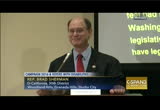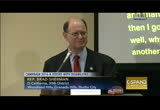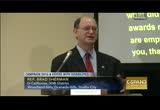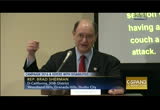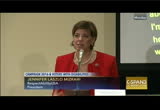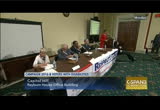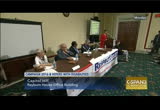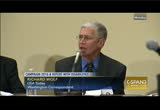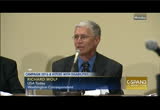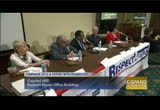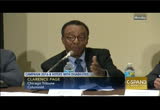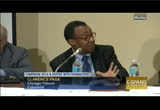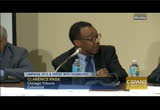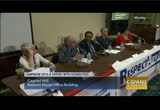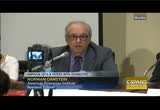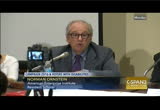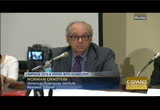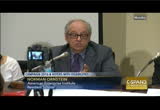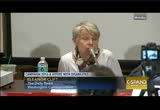tv Politics and Public Policy Today CSPAN August 11, 2016 5:42pm-7:01pm EDT
5:42 pm
♪ >> campaigns are always flamboyant, and as the candidates moved across the country they were surrounded by all the traditional vote-getting glitter. >> good to see you. >> is this your daughter here? >> but there was a series purpose behind the banners and balloons. each candidate was meeting the people, giving them a chance to evaluate his thoughts as a potential president and to look closely at him as a man.
5:43 pm
>> nixon! >> laconia's people in the fall are part of one of nature's post impressive pageants. the leaves turn and the ducks drop in briefly on their way to the south, the countryside signals the end of a season with a stillness and grandeur, interrupted only by the sounds of children returning to school. the people of the united states went to the polls to elect their president. confronted by a decision that could hold the key to the nation's place in the world. but they knew that whoever the new president would be, he would receive the support of the entire nation as he was given the awesome responsibility of leading the country. >> how different from that morning eight years ago. >> and in this election year, the nation chose richard nixon, bringing to its final conclusion a democratic process that had started months before in new
5:44 pm
hampshire. >> a very gracious message from the vice president. i know exactly how he felt, having lost a close one eight years ago and having won a close one this year, i can say this. winning's a lot more fun. >> did nixon win? >> yes, he did. >> really very exciting. he made a great speech. >> it was very, very close. >> i'm sure you'll be able to watch it. >> a kid yelled out when we came in from recess, nixon won, and everybody said they looked around and everything. >> were they happy? >> yeah. >> they were? well, i'm really glad that i voted for nixon, because i believe that he can really get things started again. it all boils down to the fact that the country wanted a clean sweep, and this is what nixon is going to do. he's going to -- he's going to get in a whole new bunch of people who will have a different outlook on things, and this is what we needed. >> it's just overwhelming. i couldn't -- i've never been so
5:45 pm
pleased at a political outcome. >> naturally, as a democrat, i'm unhappy as anyone, but in a sense, i think there's a certain amount of justice there. i think that what the american people have done is told nixon, have told johnson, humphrey, anybody who might be president now and in the future, that they're accountable for their actions. they're accountable for their policy. ♪ american history tv and prime time continues tonight with a look at the life and legacy of 1968 presidential
5:46 pm
candidate hubert humphrey. beginning at 8:00 p.m. eastern with cspan's contender series, and that's followed by hubert humphrey's presidential acceptance speech and later, road to the white house rewind features archival video footage of the 1968 presidential campaign. american history tv airs on cspan's every weekend through the events, interviews and visits to historic locations. this month, american history tv is in prime time to introduce you to programs you could see every weekend on cspan 3. our features include lectures on history, visits to college classrooms across the country to hear lectures by top history professors, american artifacts takes a look at historic trshz, real america revealing the 20th century through archival films and newsreels, the civil war, where you hear about the people
5:47 pm
who shaped the civil war and reconstruction, and the presidency focuses on u.s. presidents and first ladies to learn about their politics, policies, and legacies. all this month in prime time and every weekend on american history tv on cspan-3. respectability usa is an organization that advocates for the disabled. they held a day-long conference this week on capitol hill to highlight the challenges these voters face when trying to take part in the political process. in this panel, experts talked about how campaigns and organizations can put together events that are accessible for people with disabilities. excellent. so, i want to thank you and welcome you to our second panel of the day, which is on not forgetting people with disabilities when planning events. it's very easy to plan an event at your home or another location that may not be accessible, and people often plan events not
5:48 pm
thinking that they want to exclude someone, but just not thinking about what they need to do to make sure they are inclusive of everyone who may want to participate. and we found that on the trail as well, with presidential candidates hosting events, a lot are fully accessible, but sometimes, there's a step to get in or the bathroom's not accessible or other issues keeping people with a variety of disabilities from even getting in, and then a lack of an asl interpreter or captioning or other availabilities for people who might need those accessibilities. and so, i want to introduce our -- i'm going to introduce our first speaker today, marion bessals, who's the director of the mid atlantic ada center. jennifer mentioned before that there are several ada centers around the country, and they are free, and we encourage you to take advantage of the opportunities that they make available. as the director of the mid-atlantic ada center, one of
5:49 pm
ten regional ada centers funded by the u.s. department of health and human services, marion provides disability awareness training and seminars on the americans with disabilities act. the center has developed online accessible meetings, events, and conference guide that i suggest you all check out, and a customer service film called "at your service" that provides guidance to ensure full inclusion of those with disabilities. marion? >> good morning. it's really my pleasure to be here to talk about something that we feel very strongly about, and i hope you do too by the end of this presentation. as lauren mentioned, the ada national network is one of ten regional centers providing information, guidance, and training on the americans with disabilities act, the ada. as you heard jennifer mention recently, the ada just celebrated its 26th anniversary
5:50 pm
of the signing of the ada here in washington, d.c. we have come a long way, and many of us with disabilities now expect today, 26 years later, we have a long way to go. and the regional ada centers are here to provide you the support you need to ensure full inclusion, whether you're providing, hosting, or attending events around voting this year. we encourage you to go to our website, find your regional center, connect with us, we answer any questions you have about the ada or disability
5:51 pm
issues, and you can reach us at 1-800-949-4232. as was mentioned, we're funded by the national institutes of disability, independent living, and rehabilitation research, which is a part of the department of health and human services. and we are a free service. i want to talk about disabilities. and i want to make sure that we start about what is a person with a disability? because there's still a lot of confusion to date. the ada protects people with all kinds of disabilities, both physical and mental, so we're talking about folks like mobility limitations, like myself, who uses a wheelchair, folks with psychiatric conditions, intellectual disabilities, health conditions and other disorders. we also cover people with communication difficulties, those that affect hearing, vision, and speech. i'm going to focus just a few
5:52 pm
minutes on physical disabilities, because those are the ones people think about the most. you see the wheelchair symbol that emphasizes aspects of disability, and a lot of people have a tendency to feel that people with mobility disabilities are basically the people that they're worried about or concerned about. so, you need to make sure your facilities are fully accessible, that you have ramps, 36-inch clearance in walkways, 32-inch cleared doorways, accessible bathrooms with grab bars and easy access and a lot of people focus on that. we have tools on our website that provide guidance on how to make sure your facilities are fully accessible. we have an existing facilities checklist that makes it easy for you to determine if your facilities are accessible. we find that people are much more challenged, though, when it comes to including people with communication disabilities.
5:53 pm
and we're going to focus on a few of those today to give you some guidance. for people who are blind or have low vision, we're going to talk a little bit about respectful and helpful interactions. we're going to talk about having courtesy. identify yourself when you approach or meet an individual with vision disabilities. let them know if you are leaving and who you are, your name, if you have to pass somebody with a vision disability, or come near their personal space, give them a verbal alert that you're coming, that you're leaving, who you are, and when you leave. we all are probably familiar with watching somebody give somebody who is blind or low vision guidance, so we want to make sure that you ask them if they would like guidance, first and foremost, and then offer them your elbow, and describe where you're going, what's in front of you, and give them
5:54 pm
guidance to and from locations if requested. there's a lot of auxiliary aids and services for people who are blind or have low vision. we want to make sure that all the materials that you're providing are provided in an accessible format, and those formats are large print, braille, audio, and electronic. we also encourage you to have qualified readers so that people who are on site will be able to read a document to an individual with vision disabilities. there are sitthings as secondary audioprogramming to provide the description of visual elements during televised broadcasts or recorded audio and visual prekss. with your printed materials, you need to think about things before you print them. you want to make sure they're designed for legibility and to reduce the need for other formats or individualized assistance for people with low
5:55 pm
vision. what does that mean? it means simple and easy to read fonts, fonts without sans serif, the little curly cues, fonts that are bold and easy to read like arial and verdana. we want good contrast between the text and the background, so you don't want lots of water marking and little subtle pictures behind, which makes it more difficult for people to be able to read. you want to make sure your materials are a non-glare finishes, and you want simple, uncluttered designs to make it easier for the distinguishing of visual and written materials. an individual may say, i really need 24-point or i need 30-point to make sure it's usable and
5:56 pm
readable for me. these are easy to do. they can produce in-house, because we all have electronic formats, right? for the materials we develop. so, you take that, you go on, you determine the font, and you print it out on a large format, sometimes 11 x 18 to make it easier to reproduce on a copier. if you only have the document in print, you can enlarge it on the copier to make sure that it is accessible for people requesting that print. braille or audio recordings are another way to ensure full access. braille documents are produced by specialized equipment, and you need to make sure that you produce that material in a format that can be brailled. this takes advanced preparation. you need to know who the braille house is, what your time frame is, so that when you tell somebody that you'll be able to
5:57 pm
get materials to them, you have a time frame, and you know how long it will take to get to the braille house and get it back. braille is -- a lot of times people that think that a lot of people are vision disabilities use braille. estimates are between 10 and 15% of the blind community uses braille. but for those who use braille, you must be willing and able to provide braille to them to assure full access to your printed materials. also, many people require audio recordings. these usually are done by professionals, but you can do them on your own if you do well-planned materials and resources to assure you have good, high-quality audio presentations of our materials. most of us deal electronically. we send things electronically or on our website. we need to make sure that the materials that we are providing
5:58 pm
to those with vision disabilities are accessible for those who are using screen readers. you typically hear the screen readers like jaws that provide or read documents out loud by converting text to mechanized speech. many of us now are able to use verbal descriptions on our cell phones, our smart phones, and our computers by going to google and having it read to us as well. all of those are formats that people with vision disabilities can be using. some of the accessibility features we need to be concerned about when we're providing materials for folks with vision disabilities is make sure that we have alt tags, which are simple text descriptions on any vision or pictures or graphics, and those are then read by the screen readers to tell people who those pictures are. you need to make sure that you have descriptions for videos and
5:59 pm
captions for those that need it for hearing disabilities. you need to make sure that you have a hyperlink that says what it is, such as the mid-atlantic ada center instead of, click here, or the website name. you need to have consistent, meaningful styles and simple tables that are easy to navigate. for people who are deaf or hard of hearing, you need to be prepared to provide written notes, printed materials, assisted listening systems, and, if requested, qualified interpreters, either on-site, like we have here today, or through video remote interpreting, which allows somebody off site to be able to watch the interpreter on their computer. and techniques such as computer-aided realtime transcription, which we have here in the room today, and open and closed captioning of
6:00 pm
televised broadcasts or any audio-visual presentations. interpreters use sign language or other manual systems such as hand codes or cues to communicate with folks who are deaf or hard of hearing. oral interpreters silently move their mouths, repeating speakers' words for the benefit of a speech reader or a lip reader. now, a word about what american sign language is, asl.
6:01 pm
of hearing and using an interpreter, it is very important to communicate with the individual themselves and not with the interpreter. and that's very hard to do because i think a lot of us may be fascinate bid watching the interpreter and want to look and watch the interpreter. but you need to communicate directly with the interpreter -- or with the deaf person and the interpreter should be off to your shoulder and so the deaf person can watch both of you at the same time and get direct communication. i mentioned cart or captioning. it is similar because they use technology to display typed
6:02 pm
record word for word, the spoken communication and sounds that are in the room. cart helps not only people who are deaf or hard of hearing, people with learning disabilities, people with interleinte intellectual disabilities and people with foreign language challenges. cart is a very useful tool for many individuals n large rooms, it's very helpful if you're in the back of the room where you may not hear as well to be tiab to read the cart. video relay service has transformed the way people who are deaf or hard of hearing can get communication. that is through the telephone instead of using now a tty, we use video relay service which allows a person who is deaf access to the computer to relay to an interpreter who will then sign language back and forth and then communicate with someone on the phone and then communicate that information back to the deaf person using asl instead of
6:03 pm
typed information. it's much more organic and effective tool in communicating with people who are deaf or hard of hearing. and i hope you all have the opportunity to use that in communicating with folks that are deaf or hard of hearing. service animals. many individuals with disabilities use service animals. most of us are familiar with guide dogs for those would are blind. and in the last 15 or 20 years, the expansion of people who use service animals has been greatly enhanced. we now have people using service animals who have epilepsy, diabetes, deaf or hard of hearing, wheelchair users, psychiatric disabilities and neurological conditions. we have a number of useful tools on our websites that we encourage you to use. we have a meeting, events and
6:04 pm
conferences guide that provides information on how to assure a meeting large or small, conference large or small, any kind of event both indoors and out by using our accessible meetings events and conferences guide. free on our website to help you determine how to assure your meeting is fully inclusive. we have 20-minute customer service film that is captioned, audio described and in spanish and there's a 20 second preview -- sorry, two minute preview that will show you what it's all about. so the bottom line, be pro active. establish nondiscrimination, equal opportunity policies and include an events promotion and materials, information about what you're doing, establish, publish a reasonable deadline for participants to make
6:05 pm
requests that will require individualized responses. and remember to include your speakers, guests, volunteers, and others to assure full inclusion. train your staff. disability etiquette, respectful interactions, providing assistance, making sure you have the materials in accessible formats. and talk about accessible features such as location of relief for service animals. and if you have a question, contact us. the ada national network is available 1-800-949-4232, both voice and tty and visit our hospitality initiative for more customer service tools at www.adahospitality.org. thank you very much. >> thank you, marianne. we hope that everyone was able to hear a lot of wonderful how tos in terms of being able to ensure your events are
6:06 pm
accessible. at the end there will be some time for questions as well if you would like to follow up. but first, i'd like to introduce everyone to rodney hood, the corporate responsibility manager at jp morgan chase and company. he works in the office of nonprofit engagement where he is responsible for managing relationships with national organizations that assist the bank in strengthening communities spurring small business development, providing community development, financial capability and affordable housing. prior to joining j.p. morgan chase, rodney hood was appointed by president george w. bush and confirmed about it senate as vice chairman of the national credit union administration. the regulatory body for america's credit union system. while there, he served on the board of directors of neighbor works america along with counterparts from fdic, occ,
6:07 pm
federal reserve, and hud. jp morgan chase in collaboration with the world institute on disability recently launched the conference accessibility initiative which aims to fully integrate disability access issues into the content and enable people with disabilities to fully participate in critical national discussions of economic opportunity and inclusion. so now i'm going to turnt floor over to rodney hood who is going to give an example of taking this accessibility to the next level. >> great. thank you, everyone. good morning. on behalf of jp morgan chase, i'm absolutely thrilled to join you this morning at the respect built summit. jennifer hats off to you and your fine team for really this morning assembling some of the country's most active leaders, advocates, and supporters in the disability community. j.p. morgan chase, proudly supports respectability and its
6:08 pm
mission to increase the independence, security of opportunity, and quality of life for the disability community. our firm realize that's people with disabilities experience economic hardship at rates exceeding the national average and face unique challenges with access to financial education and financial capability tools. at j.p. morgan chase, we believe the private sector has both a responsibility and role to play in helping address economic and social challenges. for us, it doesn't mean simply working alone or writing a check. rather, it means working in partnership with nonprofit organizations such as respectability that are actively engaged in the communities we serve. i'm delighted and pleased if you would allow me to come and join today to talk about our new conference accessibility initiative. working in partnership with tom
6:09 pm
foley from the world institute on disability, j.p. morgan chase is providing physical access and subject matter integration into ten of the country's largest civil rights and community development conferences taking place this year. some of the conferences, ladies and gentlemen, have already taken place. those have included the naacp, in fact, jennifer mentioned some of these earlier. some of the conferences including the naacp, the national fair housing alliance, the national council of araza and just last weekend, the national urban league. upcoming conferences include the corporation for economic development and the group that lauren mentioned where i served as a board member, neighbor works america. ladies and gentlemen, our goal is for the jp morgan chase conference accessibility initiative are twofold. first, we want to create more inclusive advocacy and community development communities. and also, we want to expand the
6:10 pm
way people think about diversity and inclusion. what are some of the highlights of our conference and accessibility initiative? one, we will have a service for all the conference participants. in fact, we've had that booth already. there already scholarships provided and for the conference registration. also, there cynt inauguration to the -- integration into the saward ceremonies that, is subject matter experts on disability issues serving on the panels. precenters themselves with disabilities and similarly to what marianne is talking about, we're going to make sure in sponsoring the events that there is closed captioning, c.a.r.t. and asl interpreters. and one of the other components, we want to make sure that there are specific panel discussion onz disability related topics w
6:11 pm
this initiative, j.p. morgan chase along with w.i.t. is actively intervening to make community development and policy conferences more accessible to and inclusive of people with disabilities. large civil rights and community development conferences help to set at agendaa for economic opportunity. the conferences we've selected attract key decision makers for the nonprofit, business, and public sector kmunltcommunities. they aim to integrate access issues into the conference content enable people with disabilities to fully participate in the critical national discussions of economic opportunity and financial inclusion. to parir paraphrase one of our colleagues from w.i.t., he is really excite the because the conference that's we're working with will give people with disabilities a seat at the table. i'm excited about working with many of you all in this room in the days to come.
6:12 pm
and i'd also like to encourage you to continue to not only learn about our initiative but for some of you in this room to apply for some of the scholarship that's may exist for the conference that's are coming up. again, the corporation for economic development, neighbor works america. if you all have an interest in applying for them, please go to www.wid.org. again that, is www.wid.org. so that you, too, can apply for some of the scholarships or share those scholarships with some of your network. so thak said, again, thank you. we're excited about this being the first year of us having launched the conference accessibiliacces accessibility initiative and i look forward to keeping you abreast of our effort as we move along. thank you again. >> thank you very much. i'm now going to open the floor to questions. please keep your questions short as i will be repeating them for the benefit of our viewers watching on c-span.
6:13 pm
[ inaudible ] >> wid.org? >> yes. >> the question is for more description about the conference initiative? rodney? >> yes, sir. so when you go to the www.wid.org, you will learn both about the world institute of disability and there is also a space on there that talks about the conference accessibility initiative and the upcoming conference that's they'll be supporting. >> is this a one year thing, is this a permanent initiative? >> the question is, is the conference initiative a one year thing or a multiyear program? >> we're already looking at what we'll do next year, ma'am. it was just announced this march here in washington that american association of people with disabilities at their
6:14 pm
conference. so i'm pleased to say that we're already looking at how do we fine tune and enhance it for next year? >> suppose i was organizing a political vent in a swing state, how do i find an asl interpreter? do you want to expand on finding a wide variety of requests for accessibility? >> that's a great question. for specifically finding an asl and american sign language interpreter, many states have an office for deaf and hard of hearing and either governors office or as a statewide office. that would probably be one of the easiest and fastest ways to find a qualified individual to provide asl. another office would be to see if there's a governor's office
6:15 pm
for individuals who are deaf or hard of hearing as well as people who are disabled. many governors offices have those as well. you can also call your local center for independent living. their often calls cils. you can google that in the area that you will be working in whether it be the state capital or another major city. can you google the center for independent living or go to ilr u-dot organize and it will have a list of all the centers for independent living. that is a great place to find a local asl service provider to provide that interpreter service. for other types of materials, day two would be a great one. can you call the ada national network. they will connect you with entities within your state to be able to find an appropriate service provider.
6:16 pm
to assist new making sure that that setting was fully accessible. >> how do you address questions of cost when the company or an organization and they look at the issue of accessibility and as a society, cost effectiveness of it and how it saves costs elsewhere and just financial issues? >> the question is, how do we address the issues of cost when an organization is asked to provide different accessibility features? >> go ahead. >> that's a really great question. and we hear that a lot. for any entity, we suggest that you build in to your basic budget and accessibility line item because providing accessibility can be somewhat expensive depending on what kind
6:17 pm
of accessibility requests you have. for a nonprofit and government entities, there is no resource to provide that additional support. it needs to be built in and provided for for profit businesses, especially small businesses. the ability to provide either asl or other forms of communication. it can be paid for with a tax credit or a tax -- yeah, a tax credit that is available for small businesses. and we have information for that on our website. but for businesses in general -- large businesses and/or state or local governments or nonprofit or volunteer organizations, there are not many supports available. and at that point, depending on the type of entity it might be an undue hardship to provide some accommodations.
6:18 pm
but you're required to provide as much as can you and as fully as you can. and again, if you have a question or concern about how to do that, you should call the ada centers and we can walk you through the resources. many people say oh, it's too expensive, we can't afford to do it. without investigating and finding whuithout finding out wt resources are available in the community. you might find someone who is willing to volunteer to provide those services in the community. so you're required under the ada to investigate all resources. and one of the things that i would suggest is going back to the individual who's requested it. and say, you know, do you have recommendations for how i can find good quality resources to provide the support you're asking for? and then to see if they know alternate resources, if indeed, a lot of political action groups are volunteers and they have no
6:19 pm
political background or funding. and they're trying to do grassroots initiatives. and there may not be any source of funding to provide information or resources for folks with disabilities. but that doesn't get you off the hook. you really need to investigate and provide as much as you can. explore all opportunities and make sure that you're providing as much access as is allowable under the budgetary constraints you may have. >> i agree with marianne wholeheartedly. i would just add for us for the conferences i mentioned that j.p. morgan chase is supporting, we're building that into our sponsorship. so weert ones that are incurring the cost for the c.a.r.t., captioning, asl interpreters and what not. as you host conferences in the future, i ask that you maybe have a line item for some of your sponsors to consider supporting that. if you're doing events and
6:20 pm
things of that nature in the future. but for us, we recognize it can be costly. but it's so critically important. >> and they give out and pay towards our c.a.r.t. here today. so they are available specifically for politicians who are going to be using c.a.r.t. for the first time. and other small organizations and nonprofit who's might be interested. and so i recommend looking and seeing that there might be other organizations out there that are really trying to push an agenda of inclusion. >> yes? >> question. a lot of time you have a lot of groups, church groups, social groups, community groups do programming and things like that that are manned by volunteers and have a great knowledge.
6:21 pm
is there a checklist to figure out how they can be accessible? i work with a county commission. dinlt know to go across the hall. is there like a checklist that they might be able to go to? >> the question is about a checklist for ada accessibility which, yes, there does exist. you want to take that? >> yes. events, conferences and meetings guide that i talked about that's on our website does have just exactly that. so it covers small meetings. it could be your inviting the community to come and maybe only ten people come. but you want to talk about do people need accessibility and then get them to request it. and it talks about how to do registration, how to outreach to the community, what the physical space should look like, how to secure asl interpreters, the materials and how to provide it in multiple foremats. all of those issues are covered. so that would be exactly i think
6:22 pm
what you're looking for. it's in different seg mentes so can you enter as a host, planner, or attendee of the meeting. >> this conference that you mentioned, it is just accessibility in the sense of communication or does it deal with an employment persons with disability? >> i believe you're asking what are the conference that's you're talking about, specifically what the conferences do and pay attention to? yeah. >> okay. great.
6:23 pm
this year you're around community develop ment, financial inclusion and civil rights. the naacp, the urban league, national council, these are all large civil rights organizations that oftentimes are discussing national issues regarding financial access and inclusion. when we think of the decision ability community, many are disproportionately left out of the financial mainstream. and what we're finding is some of the conferences that are discussing financial access and inclusion, people with disabilities were not there able to participate in this national dialogue and the agenda that is being set. we in creating the conference accessibility initiative felt it we provided people with disabilities an opportunity to attend, they could keep issues of disability at the forefront. so when we provide the scholarships, what we're calling the disability ambassadors, they're sitting in the panel discussions. they're asking the speakers what are you doing around disability rights and advocacy? you are thinking about
6:24 pm
disability communities when you're looking at new financial products and tools and resources? so i don't want to imply that folks were not discussing those disability opportunities before. but what we're doing is we're keeping it front and center. and we're really going to make sure that again folks who here to for have never been engaged in the conferences are now going in a meaningful and impactful way. and when they, being the disability ambassadors, we ask that they not only ask questions and interjekt questions, but we ask that they keep a blog that they really again adding to the content at these particular events. >> as jennifer mentioned before, intersection alt is really important. by including people with disabilities and conferences that are focusing on other issues of civil rights and disenfranchisement that maybe the intersectionality hadn't been discussed before, people from both communities can learn from each other and further
6:25 pm
agendas together. >> time for one more question? >> does that answer your question, sir? in terms of the intersectionality and making it front and center and integration of the panel discussions and making sure there are agenda topics around disability and things of that nature. again, things that may have never taken place before the initiative. >> would your conference discuss that? >> yeah. it could be an agenda item. we're having the opportunity to help set that particular -- i wouldn't say set the agenda but we're able to encourage topics. for example, at the recent conference we hosted this past weekend in baltimore with urban league, they had a career fair and then there was there a disability booth there for folks who want to get employment opportunities with disabilities. so it's a whole number of things
6:26 pm
that can be made available. those are the things we're hoping to do. the national conferences, they all address those issues. >> i'm very thrilled. thank you. i share your excitement. >> can you say that louder? >> i want to know if there is any type of conference that, you know -- >> do you have to have invitations to attend the conferences? >> actually, for using our conference accessibility scholarships, if you go to www.wid.org that, gives you opportunity to apply for the scholarships we have available. that conference transportation and registration for the event. other than that, the conferences are open to other folks who want to do the registration or the owner court. but we're having a separate group of ambassadors who get
6:27 pm
together. people from all walks of life can apply -- i mean can you register. but again for our conference, www.wid.org. >> time for one last question. >> i've been trying to get board of election commissioners in new york state to make events accessible and do training. and it's part funding but it is also attitudes and preconceived notion onz what is doable and misunderstanding a lot of time about what is needed. and i'm wondering what can be done to try to educate people like that who have possibly the money but then they're having a problem seeing the importance of it. >> organization that's maybe have the money to pay for the accessibility features but their add tudz and they don't think
6:28 pm
about doing it or understand why. >> you mention board of elections or other entities. a lot of groups don't really consider people with disabilities as part of a group that they should be reaching out to. and we want to change that dynamic. we want to make sure that people with disabilities are brought to the table. and part of that is making sure that things are accessible so they can get to the table. either communication wise or physically wise. so one strategy i would say would be to engage the disability community and have them actively request information and to be brought to the table. so talk to your centers for independent living. talk to your commission onz disability in the community. talk to specific disability groups like united cerebral palsy, ms society, the national
6:29 pm
federation of blind, the national association for the deaf. all of these have chapters within your communities. engage those communities to be able to request and demand the training to be able to bring to the table to be part of that engagement. so that they can really be active participants in voting and in community integration. it needs to be a groundswell from the bottom up and then actively talk to other entities, elected officials, making sure that they're aware that people in the community want to be engaged and requesting that kind of engagement. so there is any number of levels of people that can be involved. but it has to be a commitment and a movement. and can you start it. each of us has the responsibility to ensure full inclusion. that is how the ada works. and that's how our democracy
6:30 pm
works. if we each take on that responsibility and that commitment to ensure full inclusion of people with disabilities. >> i love. that each of us have the responsibility to ensure full inclusion of people with disabilities whether you have a disability or not. that's a wonderful way to close this panel. we're going to be taking a short bre break. at 11:00, the representative who office helped us secure this room will be addressing the conference. and following that, we have a wonderful panel of some really great journalists including eleanor clift of "the daily beast," clarence page of tribune media services and richard wolf of usa today will be talking about campaign 2016 and beyond. insights on the media, come pains, public policy, the supreme court and people with disabilities.
6:31 pm
so we'll be taking a short break now and we look forward to starting up again. that's at 11:00 a.m. thank you. >> brad sherman outlined ways the disabled community and advocacy organizations can engage with lawmakers to get issues addressed in congress. respectability usa, the host of this day-long conference is an organization that advocates for the disabled and works to address stigmas and government policies that hurt the disables. >> hello. i'm president of respectability, a nonpartisan, nonprofit organization working to advance people with disabilities so people with disabilities can
6:32 pm
have opportunities just like anyone else. people with disabilities are one out of every five americans. that's 56 million of america's citizens here in this country. we have no better friend in congress than congressman brad sherman of california. he actually has been on the front lines of the issues personally and professionally. he's also a close personal friend of mine who i've known for an extremely long time for his devotion, his intelligence, his integrity and what he does for people not only in this district but around the country. he's published op-eds on employment for people with disabilities, he spoke out on these issues. he's engaged in these issues personally and so he is also helped our organization and indeed he is our official host for this event and we are thankful to him for providing
6:33 pm
this room in the u.s. congress for the training seminar. there is no better are friend for the disability community than congressman brad sherman. thank you for being with us. >> my only request is that you be the person introduce me wherever i might speak anywhere in the country. i'm brad sherman from california's best name city, sherman oaks. it's an honor to be with you and i hope that i've been invited to speak because of the wisdom i have and accumulated over the last 20 years in congress and not just because i got you the room. but by definition, depending upon your definition, those with disabilities are the largest minority group in the country and one of the few that you may join at any point in your lives. baest, all of us are tabs,
6:34 pm
temporarily able-bodied. it is also the most disadvantaged economic group in this country. 28.7% of those with disabilities are living in poverty. that exceeds any other racial or ethnic group. 22 million working age disabled adults live in this country. only one out of three have jobs. you've got other experts to talk to you about disability and about how to -- as a community, to overcome the difficulties that you face. i'm here to talk a little bit about how to persuade members of congress. how to lobby when you don't have a pac. i'll go through some points. first, have allies and create a coalition. whatever -- when you hand that
6:35 pm
paper to a member of congress or senator, you're going to want to say this is endorsed by the entire community. the one thing that will make a member of congress reluctant to help out is the fear that they're going to sign on to your program only to hear from others in the same community that they should have gone in another direction. second, keep in mind how busy and thinly spread a member of congress is. i'm talking about disability issues now. i'll be working on banking regulation when i go back to my office. right before that, i was focused on the jofna peninsula. if you don't know where that, that's fine. but it just illustrates that just as the member of congress doesn't know a lot of what you know, that's because they have to know a lot of things you don't have to know. so they're an inch deep and a
6:36 pm
mile wide. members of congress, when you meet with them, want to make you happy. first of all, it's a con gene c defect. we need to make as many people as possible happy and, third, you're the good guys. but when people come to talk to us, we always feel that it's not a no-brainer. the people talking to us always think their proposal is a no-brainer. of course, invariably, what they're proposing is either going to take a lot of political capital and time for the member of congress they're talking to or it's going to have strong opposition in the bureaucracy or the ideologies that run around washington or it's going to cost government money. so there are very few slam dunks. there are many more
6:37 pm
opportunities to persuade but if it really didn't cost anything and was spectacular and everybody agreed about it, it would probably be a suspension bill that already pass 20d years ago. now and then there is a magician thrown out of society for revealing how the tricks are done. i'm about to get thrown out. i want to tell what you i learned in politics 101 but in politicians 101. how to deal with the media. how to deal with the request. i was told this by politician in his 90s back in my area. i'm sure he's not the only one. he said, brad, never put it in writing if you can just say it. never say yes or no if you can just nod. never nod if you can get by with a smile. and best of all, see if can you
6:38 pm
get by with just a wink. what do you not want out of a meeting is a smile. or a general belief that person you're talking to loves them and hasn't really committed to anything. now a lot of people come and they're just real happy to see a member of congress. they want a selfie, that's fine. that may be important. and so many of you have incredible stories of how you've triumphed over an impedestrianment. and that's a person story. you may want to provide general information. even if you provide that general information, by the time the member of congress has a chance to use it, there have been 500 other meetings on banking regulations and the jofna peninsula.
6:39 pm
and they may have forgotten. when you come, the question i ask, the groups that i like is if you controlled this right hand and this voting card and this pin, what would it do? if you have a solid answer to that question, then you can leave that meeting with something tangible. zbou into the meeting saying, here all the groups in our community. they all want you to co-sponsor this bill. they all want you to put out a statement saying you're going to vote against that bill. we would like you to sign a letter to the appropriation committee saying to fund this program at no less the $116 million. we want you to sign this. we want you to vote that way. we want you to co-sponsor. if what you swant just an understanding and appreciation of what you've accomplished, there are many people that can
6:40 pm
provide that you to. only the member of congress can provide with you that letter that, co-sponsorship or that vote. so ask for something specific, don't leave until you get a very specific yes or no. and if it's a no, just don't leave. and in the final thing you may want is a letter to an administrative agency saying fund this grant or change this regulation. now if you're aiming to get congressional action, pass a bill, get an appropriation, you want to make sure that you have a balanced group of members of congress on your side. and republicans are more valuable to you at this time than a democrat f you're trying to influence an executive agency, you don't have to worry about balance and the democrats are more valuable than a republican. so keep that in mind. so who you want to sign the
6:41 pm
letter depends a little bit on who the letter is addressed to. and if what you want is a telephone call or something that you can't see being done, the question is who on your staff do we call to get a report on whether you made that phone call? and how it went. you may seek a meeting in washington. you may seek a meeting in the district. if you want a meeting in washington, you may just want to meet with the aides. frankly, lauren is with me here. she does all the thinking, planning, decision making. my job is to stand behind a microphone and look pretty. i'd like to think i do it well. but talking to the legislative assistant may be more important. you may be able to get that meeting longer and more relaxed during a district work period like today. i recommend trying to meet with members in their district
6:42 pm
office. if you don't get the meeting, you can show up at their meeting. and stand up at a town hall and say will do you this or will you meet with -- promise to meet with us this week person to person on that issue? another advantage of the district office meeting is that i have experts in my washington office on various legislative matters so i don't feel bad if a group meets here in washington with my -- one of my legislative assistants. zroint legislative assistants in california. so if i want them, i figure i have to do the meeting myself. you'll want to e-mail a petition. make sure that you list both the personal -- the physical address and the e-mail address. the reason you'll want to provide that e-mail address is what you want is a virtual cycle. ask them to do something. give them an e-mail list of
6:43 pm
people would want them to do it. when they do it, tell them to tell the e-mail list they did it. then tell your e-mail list to thank them for doing it and then tell your e-mail list to ask them what they've done for you lately. the best thing you want is a situation. i send out 400 e-mails to a group of people that care about something. one of them catches me in the grocery store and thank mez for doing it. and then i go to lauren and i say well why haven't we put out another one of those e-mails to the disability community? and she'll say, because you haven't done anything recently and new for that community. and my response, well, what -- give me a list of what i need to do. so that virtual cycle, do something, be thanked for something, have a list of people to tell people that you've done it. i'd like to think my colleagues would be a tree falling in the forest with no one to hear. most of us want to do good
6:44 pm
things when people who agree with them noticed. and finally, i would urge the disability community with several organizations in a -- in a coalition to rate the voting records members of congress. it could be what did you vote and what did you co-sponz sor. that's a powerful thing can you do and we can use to brag to our constituents that are actually doing something in washington. i look forward to hearing the next panel. i'm almost jealous that i don't get -- i do get to comment on their stuff because i have the microphone.
6:45 pm
bernie and trump tsunami is for the establish ment for the elite, the first heart attack that you make it through. and we all know the guy who a month after he's out of the hospital is eating the cheeseburgers on the couch. i think that the elites will survive this. and they will go back to trying to pass tpp and n. a lame duck session which is the equivalent of having a big rib dinner on the couch a month after a heart attack. and if they succeed, then in 2020, the elie 2020, the elilites will have th second heart attack. what happened this year with both bernie and trump was way outside the thinking of what the elites believed would happen. they'll adopt the policy changes or go back to the same old
6:46 pm
behavior. so i'm richard sherman from sherman oaks and thank you very much. >> thank you very much, congressman. i would like to invite our panelists to come up. we have a terrific group of panelist who's are about to speak with us. first is eleanor clift who is with oit daily beast" and who i've been following for many years on the group and when she was at "newsweek," she authored numerous becomes including those about women and political power. i'm very excited to have her here because as a woman, she's -- who has written about women's issues, she talked about disenfranchised populations and how they can get more power. and now we have a woman who is nominated for the presidency if a major party for first time. we have clarence page, a journalist and columnist who is also on the group. and he also has worked with bet. so he knows what it's like for a marginalized community to try
6:47 pm
and take power and we now see an african-american president and the disability community can really benefit from some of the wisdom that the african-american community has really brought forward. rich wolf is a writer and reporter who has been here in washington for more than two decades with usa today. he is currently focusing on the supreme court. but he's covered congress and pretty much everything in this town. he is a journalist of very, very high regard and just really extraordinary leader. then we have a sometimes journalist, sometimes pundit, sometimes everything norm orenstein. he is extraordinarily, well, just genius on everything. he writes for numerous publications. i think you all know him from aei. and we're going to have a vigorous conversation here. we're going to talk about campaign 2016. but we're not going to do the usual stuff who have is up and
6:48 pm
who is down. we're not going to, you know, focus in on donald trump and who said what and who tweeted what. we're going to talk about this disability community. sort of what is happening in campaign 2016 with people with disabilities, what are we seeing and that we will have an opportunity for people from the audience to ask some questions. so let me put out the first question to the panel which i'd like each of you to address. which is what are we seeing in 2016? when it come to the 56 million americans with disabilities? is there a change in how the campaigns are handling these issues and if so, what are the changes that you are seeing? let's start with rich and then go all way down. >> i think one of the off justice changes is respectability is shoving microphones in front of people's faces at public events around the country. i think that's a great thing.
6:49 pm
beyond that, however, other than, you know, reminding everybody that it's the largest minority group in the country and the importance of disability issues, i think the problem that we have in the campaign and in all campaigns is that disability from the outside in is not seen as a controversial issue. it is seen as an issue that everybody agrees on, you know, everybody is for disability if only there is money. or if only there was the wherewithal to do something about employment, to do something about housing, to do something about community living, to do something about education. so occasionally when a re-authorization bill or something like that comes along, everybody is for it and gets onboard. but otherwise, it disappears into the wood work because there isn't that controversy between a trump and clinton or in the past between say a romney and obama that other issues have. it's funny because when you're
6:50 pm
involved inside the disability community which i think a lot of us are, you see all of these controversies among disability groups. my son has autism.groups. my son has autism. so between the autism speak on the one side and the self advocates on the other hand, there's tons of controversy. but those issues don't necessarily bubble up to the political level on the outside because well, they're just seen as internal issues which to some degree they are and i wish they didn't exist. i'm not sure i'm that optimistic about a huge change in disability issues in this campaign. i'm more optimistic about policy changes depending on who gets elected, and i won't get into that. but i don't see that much of a change from this year compared to past years in terms of the level of interest in disability. and again main reason being that it's just not a controversial issue. wouldn't expect unless you guys
6:51 pm
do something about this to her a question about one of the four debates about disability because i think those folks running the debates would think that's a wasted question. we're going to get a lot of nodding and winking and smiling as congressman sherman said and not necessarily the type of brouhaha that helps ratings. >> clarence? >> thank you, jennifer. norman and i were just talking about everything that's wrong with the media. nobody criticizes the media as much as media people do. we can certainly talk about that in connection with this current campaign. what is interesting to me, richard talked about the controversy. we live and breathe controversy morning, noon and night, the nugget of journalism and it's doubly especially true during a presidential campaign in which you've got ever issue, of course, under the sun competing
6:52 pm
for attention. which ones get the most attention, they're the most controversial. people with disabilities as an issue rose in this campaign when donald trump insulted a "the new york times" reporter with disabilities. made fun of him like a schoolyard bully. it was almost a whole editorial cartoon of this campaign. and everybody in the media jumped on it because it said so much about the race that you've got one candidate who makes fun of people with disabilities and one that does not. then you've got other issues where i wish people with disabilities as an issue came forth, like, for example, black lives matter, one of the biggest controversy going on these days is related to crime and law enforcement and police behavior and the incarceration epidemic, how much of our incarcerated
6:53 pm
population has disabilities. you recently did a study on this. >> right. >> a huge percentage. >> 40% of people in jail, 32% of people in prison, 150,000 people who are deaf or hard of hearing and we have 150,000 who are blind or vision impaired, 500,000 with kag any cognitive impairments that are imprisoned today. >> i turned to a nonjournalist for that. if i knew anything about numbers i would have stayed in school. tv loves pictures, hates numbers. this is one big impediment to getting serious issues into debate if they involve a lot of numbers. but you've got a lot of stories, narratives, this is what gets media attention and public attention. everybody loves stories. not many of us can recite all ten commandments, but everybody knows where the ten commandments came from. everybody knows that story of moses and the children of
6:54 pm
israel, et cetera. so it's what the bible is, it's stories. that's what journalism, effective journalism is. it's stories. so when you have a race in which -- well, we have some wonderful -- well, one key difference this year that i've noticed, between the parties, look at the conventions. which convention spotlighted people with disabilities? which had people with disabilities speaking out on stage and highlighting these issues? it was the democrats. so that was a defining issue to me in this election. it's like this is the way disability issues come forth generally is when they are part of a larger debate, either a partisan conflict or just human relations conflict. i expect to see the issues returned. already donald trump is talking about deregulating government. i think he made a sweeping
6:55 pm
statement over the weekend. behind every regulation there's a story. we just tell people, government red tape, i hate that, you know, bu bureaucrats, blah blah blah, but we tell people about folks who are able to make a living and are independent and had to be dependent before. everybody loves that story. i could go on all day. i'll give you a chance, norman. >> it's great to be on a panel with three journalists who walk the walk and talk the talk. char clarence and i were talking early, no one is more critical of the media but the media. it's almost stop us before we kill again. first to reiterate what clarence did did f you googled disability and campaign 2016, the first
6:56 pm
hundred items that would come up is donald trump's ridicule of the "the new york times" journalist. that's what brought this to the campaign stage, not policy. there may be another element because at one point trump bragged about all he had done with the disabled community with his hotels and properties as if it was a gesture of humanity when he was just complying with the ada regulations. part of the problem is that media coverage of the campaign is virtually polly free. journalists know nothing about policy, maybe enough to ask one question in a debate but a follow-up is simply not possible. in many ways for me, a defining moment in the campaign, it wasn't about the disability issue. donald trump was about to hold a press conference where he had gone over the top in terms of a majority.
6:57 pm
three cable news networks had pictures of the empty podiums for an extraordinary excruciating length of time. at the same time hillary clinton was unveiling a set of proposals for how to deal with employment in the middle class, not covered at all. it is horse race, it is controversy and it is trump. and that means that the real issues here, what we're going to do now to punk wait, are not covered at all. here we also have another problem with the false equivalents. if you look on the hillary clinton website, you will find thousands and thousands of pages of policy, including about the disabled community. and we're soon going to get an extraordinarily detailed set of policy proposals on mental
6:58 pm
health policy. donald trump has none of that. but if they cover the one, how are they going to cover the other in an equivalent fashion. so we get basically nothing. now i want to make one other point here, which is something that i believe has to be dealt with and focused on in the campaign ahead. and that is access of the disability community to the polls. there's a story just today -- you know, we've had a series of voter suppression laws that have been struck down or sent back by the courts in recent days. one of them in north carolina. and that includes an attempt to restrict early voting days. that's been now taken away. we're going to have a substantial number of early voting days. in greensboro, north carolina the republicans are trying to cut the number of early polling places in half as a response to that. take into account that the money
6:59 pm
for voting in most jurisdictions has been cut back, the machines are now extraordinarily controversial because of a fear of russian hacking among other things, but also every area has difficulty getting an adequate number of machines, the right kinds of machines, people to participate in polling places and the disability community is going to have much greater difficulty voting. the voters rigging that's going to take place may be rigging against the disability community. i'm starting to do a little work with the ruderman foundation, a wonderful foundation to deal with this problem but it is also something that otherwise is not going to come up. if we don't have the right kinds of machines for people who are deaf or blind, if you don't have the right access to polling places for people who can't get there, if you don't have early voting for those who need extra time especially, we're going to have a real problem. and that means that the plit
7:00 pm
ra political leeb raj of the community will be reduced as well. >> thank you. eleanor? >> i certainly second everything that's been said. the media is overly infatuated with the horse race and with controversy. but it has ever been thus. so you have to deal with the reality that you find. and donald trump actually did the disability community a favor by doing that mocking presentation which seared into everybody's brain. and the reporter that he made fun of, i was reading about him, he had a long standing relationship with donald trump. i think he had interviewed him over a course of a number of years, like 20 times. this was not somebody who just wandered into the trump tower one time and caught trump o
52 Views
IN COLLECTIONS
CSPAN3 Television Archive
Television Archive  Television Archive News Search Service
Television Archive News Search Service 
Uploaded by TV Archive on

 Live Music Archive
Live Music Archive Librivox Free Audio
Librivox Free Audio Metropolitan Museum
Metropolitan Museum Cleveland Museum of Art
Cleveland Museum of Art Internet Arcade
Internet Arcade Console Living Room
Console Living Room Books to Borrow
Books to Borrow Open Library
Open Library TV News
TV News Understanding 9/11
Understanding 9/11